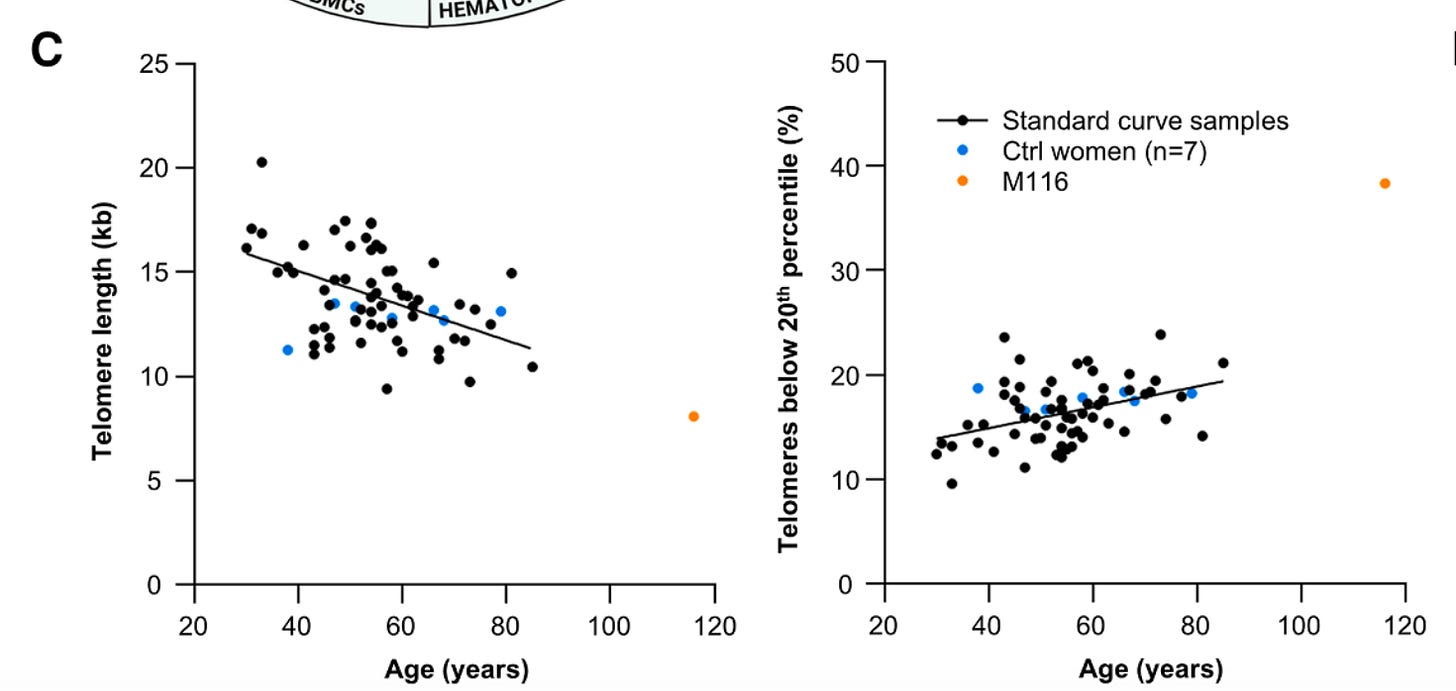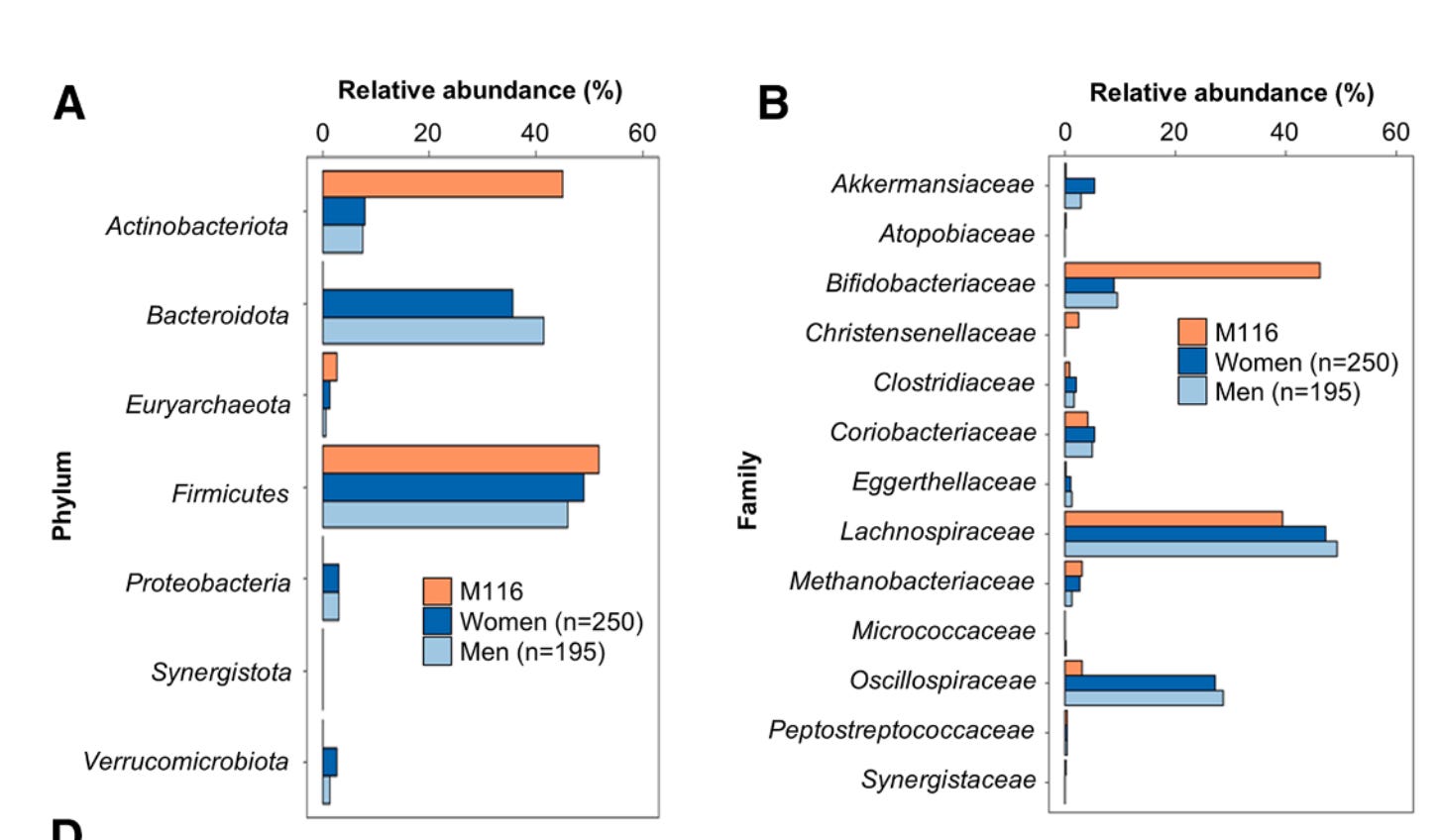Exploring the Supercentenarian
Epigenome, genome, transcriptome, metabolome, proteome, and microbiome study of a 117 year old
A new study has been published that explores the metabolome, genomes, transcriptome, proteome, and microbiome of a Spanish woman who passed away last year at the age of 117. That’s pretty much all the -omes. The researchers were looking at how and why this individual lived more than a decade past 100.
The researchers compared the supercentenarian results, referred to as M116 in the study, to other older adults to determine what was different, what drives a 30+ year extension of longevity beyond the norm.
Let’s take a look at what they found.
Telomeres: The end caps of chromosomes are called telomeres, and every time cells replicate and divide, the telomeres get a little shorter. For this supercentenarian, telomere length was very short, even in comparison with other older adults.
This is interesting because telomere length has been a focus of longevity studies for years, with an emphasis on reversing telomere shortening. The authors of the study explain: “Interestingly, because the M116 individual presented an overall good health status, it is tempting to speculate that, in this setting, telomere attrition behaves more as a chromosomal clock for aging rather than a predictor of age-linked diseases such as neurodegeneration or diabetes. As an idea worth considering, the huge erosion of the telomere sequences in the supercentenarian could also relate to the absence of any diagnosed cancer because it could limit the replicative lifespan of any malignant cell.”
The orange dot in this screenshot shows the telomere length of the supercentenarian from the study compared to other healthy adults.
Genetics: The researchers also did a whole genome sequencing and found that the supercentenarian had several genetic variants related to brain health and lifespan in prior studies. She also had rare variants linked to better heart health and lipid metabolism.
Taking the genetic data and looking at how multiple, common genetic variants increase or decrease different biological pathways, the researchers found many variants related to a strong immune system, including T cell differentiation and response to pathogens. There were also variants related to strong mitochondrial function. She had the normal APOE E3/E3 genotype.
The study subject did have a mutation causing clonal hematopoiesis of indeterminate potential, which is a common disorder seen in older adults, but it hadn’t progressed to leukemia or other blood malignancy.
Cholesterol: The researchers look at lipid levels and other markers of lipid metabolism. They found that the supercentenarian had one of “the most efficient lipid metabolisms report” in comparison to a control group living in the same area. She had low levels of triglycerides and VLDL, along with high HDL. She also had lower levels of saturated fat, linoleic acid, and esterified cholesterol, along with high levels of free cholesterol.
Gut Microbiome: This is where it gets really interesting (to me). The supercentenarian had significantly higher Actinobacteria gut microbes, which is the phylum for Bifidobacteria. Her Bifido abundance was around 50%, while the average was around 10%! High levels of Bifidobacterium are also associated with the healthy lipid-related biomarkers that this woman had.
Epigenetics: Biological age tests that measure epigenetic changes showed that the supercentenarian had a much younger biological age compared to her calendar years. The researchers used six different epigenetic clock tests, with all of them agreeing that her biological age was a couple of decades younger.
Takeaways:
OK - so what can I personally apply from this? This supercentenarian had genetic variants that promoted good lipid metabolism and an immune system that aged well. She also had fewer genetic variants with negative associations, such as not having APOE4.
So, avoiding heart disease and neurodegenerative diseases is good… and having a microbiome that is shifted towards high levels of beneficial bacteria is also good.
I’m not going to be able to change my genes, but it should be possible to positively affect the gut microbiome. Notably, the supercentenarian in this study regularly ate large amounts of yogurt, which likely contained Bifidobacteria.
A number of studies over the past decade have associated bifidobacteria levels in the gut microbiome with longevity. Centenarians have higher Bifido levels compared with the microbiomes of younger elderly people. Specifically, studies in Sardinia, which is known for its long-lived population, showed that Bifidobacterium adolescentis may be a key species in the gut microbiome for promoting health. In Estonian centenarians, researchers found that Bifidobacterium dentium and Bifidobacterium longum were likely the beneficial species.[ref][ref][ref]
Probiotics containing these Bifido species are readily available. Here are a couple that I like: Gut Institute BifidoMaximus, Custom Probiotics, and Seeking Health Bifido. These are Amazon links so that you can see the reviews; however, I personally don’t like ordering probiotics off Amazon because I don’t know how they have been stored or what the expiration date is.
The other takeaway is that I could easily start eating more yogurt or making my own. I think I’m going to give this Instant Pot yogurt recipe a try this week, perhaps with some extra Bifidobacteria from a probiotic added.
Let me know in the comments if you’re a regular yogurt eater and find that it is healthful or beneficial.





Great write up Debbie! Thank you! I missed it last week, because I was on a much needed little vacay to the California Central Coast. Thanks for sharing your thoughts on this. It's really interested. Wouldn't it be fun to be able to do a comparison of our genetics to hers! HA! Someday, I would like to figure out what her blood type was too, I think blood type and Secretor status could hold some keys (but I'm no scientist, far from it. It's all fascinating to me and learning about this stuff has been so helpful in my life. I'm APOE3/4, so I doubt I will be living past 100. I'm just trying to keep functional and happy as long as possible. My paternal grandmother was Italian and lived to be 94, she died in her sleep and her only health issue was osteoporosis.
I'm with you on the yogurt and working on beneficial gut flora. I don't have the Instapot with the yogurt setting, but I've heard you can still do it in the one I have. I bought the Alexendre A2/A2 Plain yogurt yesterday. I don't know how she ate 3 servings a day, she had a great appetite. Her meal plan for the last decade of her life was pretty amazing.
Thanks for all you do! Please keep it up!
Interesting!